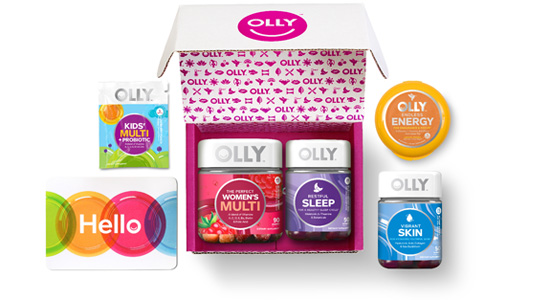Eric Ryan, the CEO of Olly and co-founder of Method eco-friendly cleaning products, is an entrepreneur known for shaking things up and marketing products in categories very differently from existing brands. With Method, Ryan says he was “…looking for a category that was really big, but had failed.” He “wanted to close the cultural gap” between what cleaning products mostly were then with what most people really wanted, which was products free from toxic ingredients “with a design flair they would welcome in their homes as an extension of themselves.” His hunch was successful as Method generated sales over $200 million and was sold to Ecover in 2012, just over a decade after being founded.
When it came time for his next entrepreneurial opportunity, Ryan was helping his clients at Target develop the “Made to Matter” program which features innovative, better-for-you, eco-friendly products across multiple consumer packaged goods categories, including his Method brand of cleaning products. However, Ryan noticed there were no brands in the nutritional supplement aisle that he thought resonated as “better-for-you” with consumers. He noticed consumer confusion in that aisle while he was working in Target stores. He collaborated with ex-Shaklee marketing executive Brad Harrington to found Olly, which is geared towards millennials and was launched in April 2015. What started as a limited line offered exclusively at Target for the first 12 months is now a 35 SKU health and wellness line that is sold through multiple retail channels. GNC, CVS, Kroger, Albertson’s, Safeway, Stop & Shop, and Walgreens are some of the large retailers that now carry the Olly line. The Olly line is positioned as being sourced from nature, effective, and fun to take in gummy form.
Olly sells consumers on the benefits of the supplements rather than the ingredients they contain. This is a simple yet significant departure from the way traditional vitamin brands have been marketed for years. The line contains adult’s and children’s multivitamins, sleep aids, probiotics, protein smoothies, and supplements that help with stress, energy, skin, beauty, and brain health. The company lives by the “fail fast and fail cheap” motto. After Olly tried marketing products for heart and joint health that did not resonate with millennials, the company quickly discontinued the products, choosing to stay focused on its core target market. In fact, the company operates rather differently than most other consumer products or supplements companies. First, Olly treats retailers as clients and pitches product concepts to them as such and sees retailers as “thought partners.” Second, Olly prefers to execute its plan in “bite-sized chunks,” such as rolling out the line with only one retailer and a limited number of SKUs, which allowed for efficient scaling without being overwhelmed by the logistics of manufacturing and fulfilling orders of a large product line. Third, Ryan does not see Olly as a business, but as a cause where employees “live the brand” and buy into the philosophy of work/life balance, natural products, and transparency. Olly uses unconventional tools with its employees, including allowing for “recess” which allows the team to participate in yoga, kickball, or musical chairs during work days. Ryan’s team is also known for holding meetings while walking through the Presidio National Park where the company is headquartered near the Golden Gate Bridge in San Francisco, CA.
The latest launch in the Olly line includes protein smoothies, so this is likely the next category that Olly will disrupt. The company is pursuing other exclusives outside the mass merchandiser channel, including CVS in the drug channel and GNC in the specialty channel. Interestingly, Olly focuses most of its attention on brick-and-mortar retail stores, with less than 10% of its sales made online.
Learn more about Olly and other natural brands that are disrupting traditional OTC categories such as sleep aids, vitamins and minerals, cough/cold, topicals, and laxatives in Kline’s Natural OTCs: Impact of Non-drug Products on the U.S. OTC Market. Due out in September, Kline’s third edition on this subject provides comprehensive market size, market share, and research with 500 consumers to understand who the natural OTC shopper is, where they buy these products, and how they use them in relation to traditional OTCs. To learn more, CONTACT US.

